

This comes as no surprise as some of the biggest changes occurs during the adolescent years, where they are still self-discovering who and what they want to be in the future.
It is fairly common for parents to be worried about their children during this phase as this is a crucial stage of development in forging one's identity. Hence, a comprehensive resource centre has been curated for you to better understand your child during this stage of their life. Explore the different sections below to learn more about adolescent identity statues and the influence on identity formation, based on the theories by Erikson (1968) and Marcia (1966).
Introduction: What is Adolescence?
Adolescent Development. What is adolescence?
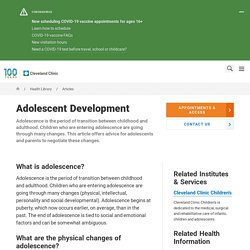
Adolescence is the period of transition between childhood and adulthood. Children who are entering adolescence are going through many changes (physical, intellectual, personality and social developmental). Adolescence begins at puberty, which now occurs earlier, on average, than in the past. The end of adolescence is tied to social and emotional factors and can be somewhat ambiguous. Cleveland Clinic is a non-profit academic medical center. Stages of Adolescence. By: Brittany Allen, MD, FAAP & Helen Waterman, DO Adolescence is the period of transition between childhood and adulthood.
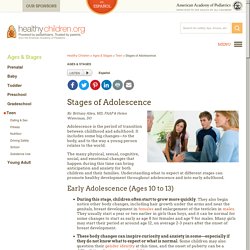
It includes some big changes—to the body, and to the way a young person relates to the world. The many physical, sexual, cognitive, social, and emotional changes that happen during this time can bring anticipation and anxiety for both children and their families. Understanding what to expect at different stages can promote healthy development throughout adolescence and into early adulthood. Early Adolescence (Ages 10 to 13) Video - Adolescence: Crash Course Psychology #20.
Introduction: What is Identity? Video - Personal Identity. Article - Positive Identity as a Positive Youth Development Construct: A Conceptual Review. Identity is a core construct in psychology because it refers to how a person addresses issues dealing with who that person is.
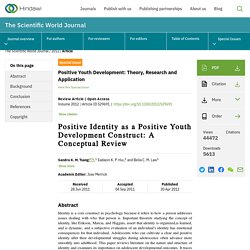
Important theorists studying the concept of identity, like Erikson, Marcia, and Higgins, assert that identity is organized,is learned, and is dynamic, and a subjective evaluation of an individual’s identity has emotional consequences for that individual. Adolescents who can cultivate a clear and positive identity after their developmental struggles during adolescence often advance more smoothly into adulthood. This paper reviews literature on the nature and structure of identity and examines its importance on adolescent developmental outcomes.
Y Studios — What Factors Really Influence Identity? What factors influence identity formation?
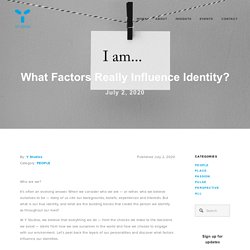
In a sense, every stimulus we experience consciously and subconsciously throughout our lives has an impact on the way we and society create and label our identities. Identity formation and evolution are impacted by a variety of internal and external factors like society, family, loved ones, ethnicity, race, culture, location, opportunities, media, interests, appearance, self-expression and life experiences. 1. Society Does our identity begin its cultivation from the moment we're born? Introduction: The Important of Identity for Teenagers during Adolescence.
Identity/Identity Formation - Adolescence, Theory Of Personality, and Developmental Reading - JRank Articles. A person's mental representation of who he or she is.
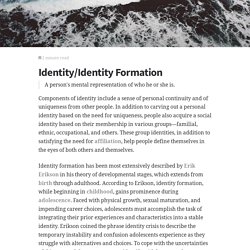
Components of identity include a sense of personal continuity and of uniqueness from other people. In addition to carving out a personal identity based on the need for uniqueness, people also acquire a social identity based on their membership in various groups—familial, ethnic, occupational, and others. These group identities, in addition to satisfying the need for affiliation, help people define themselves in the eyes of both others and themselves. Identity formation has been most extensively described by Erik Erikson in his theory of developmental stages, which extends from birth through adulthood. Why Is Teen Identity Development Important? Though it can be hard for parents to let go and acknowledge their teen needs external help, a credible adventure therapy program can relatively quickly and positively change your son or daughter’s life for the better.
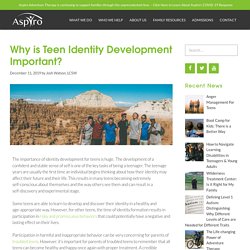
Psychologist Erik Erikson advocated that teen identity development is fostered by experiences that allow individuals to express their individuality and receive feedback and validation from others. Adventure therapy programs provide experiences that promote healthier relationships and positive identity formation in teens. Article - Why is a Positive Sense of Identity Important? Introduction: Erik Erikson's Stages of Psychosocial Development. Erikson Stages of Psychosocial Development in Plain Language. Erik Erikson is one name you might notice come up again and again in the parenting magazines you leaf through.
Erikson was a developmental psychologist who specialized in child psychoanalysis and was best known for his theory of psychosocial development. Psychosocial development is just a fancy phrase that refers to how a person’s individual needs (psycho) mesh with the needs or demands of society (social). According to Erikson, a person passes through eight developmental stages that build on each other. Erik Erikson's Stages of Psychosocial Development. Erik Erikson was an ego psychologist who developed one of the most popular and influential theories of development.
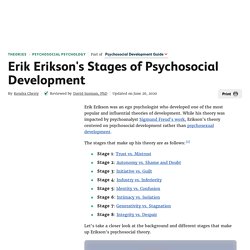
While his theory was impacted by psychoanalyst Sigmund Freud's work, Erikson's theory centered on psychosocial development rather than psychosexual development. The stages that make up his theory are as follows:1 Let's take a closer look at the background and different stages that make up Erikson's psychosocial theory. Introduction: Stage 5 - Identity vs Confusion. Identity vs. Role Confusion in Erikson's Theory. Identity versus confusion is the fifth stage of ego according to psychologist Erik Erikson's theory of psychosocial development.
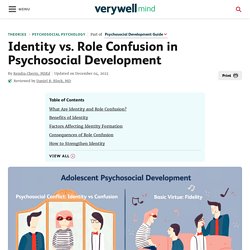
This stage occurs during adolescence between the ages of approximately 12 and 18. During this stage, adolescents explore their independence and develop a sense of self. According to Erikson, people progress through a series of stages as they grow and change throughout life. During each stage, people face a developmental conflict that must be resolved to successfully develop the primary virtue of that stage. Identity vs. Role Confusion.
Introduction: The Different Ways Your Teen may Explore their Identity. Your Teen's Search for Identity. Their bodies kick into overdrive.

They find themselves disoriented, scared and alone. They become moody, secretive and sarcastic. You don’t recognize your own child. What happened to the child you used to know? The answer: adolescence. What Is Individuation? Signs of Individuation. What Is Individuation?

When discussing human development, individuation refers to the process of forming a stable personality.1 As a person individuates, they gain a clearer sense of self that is separate from their parents and others around them. Carl Jung used the term "individuation" extensively in his work on personality development. This process of developing a separate identity is an important goal of adolescence, but it is something that continues throughout a person's life.
Teenage Self-Identity Issues: Causes, Problems, And Common Behaviors. While there are a variety of ways that teens experience identity formation, some experiences can become very harmful to the individual. In the sections below, we discuss the causes and more serious issues in teenage identity issues & development and how parents can help.
Common Causes Contributing to Unhealthy Teen Identity Development. Introduction: James Marcia's Identity Status Theory. Identity Development Theory. Identity Development Theory A well-developed identity is comprised of goals, values, and beliefs to which a person is committed. It is the awareness of the consistency in self over time, the recognition of this consistency by others (Erikson, 1980). Identity Status Theory – Adolescent Trends for Dummies. Identity Status Theory Identity consists of your sexual orientation, your values and morals, your religious beliefs. Usually people commit to their identity around the ages of 18-22 years old. A person who does not know who they are might not be able to describe what their strengths and weaknesses are.
James Marcia's Ego Identity Statuses Explained. Marcia's States of Adolescent Identity Development. Ways to Support your Teenager through their Journey of Self Discovery. 4 Ways to Connect Better With Your Teen. Being a parent is hard. Being a parent to a teenager is even harder. In this week's 'Teen Talk' column, a young adult shares how parents can connect better with their teenagers who seek a balance between disciplinarian and friend. All connections are personal choices that require trust.
5 Ways You Can Help Your Teen Create a Positive Identity. Six Ways to Build Your Teen's Identity - Focus on the Family. How to Support Your Teen’s Identity.